-
Rendez-Vous with French Cinema at Lincoln Center 2014

. . . . March 6 – 16, 2014
Rendez-Vous with French
Cinema 2014
March 6 – 16
To provide feedback to reviews and get day-to-day updates on screenings go to the Rendez-Vous Forums thread HERE.
Links to the reviews:
2 Autumns, 3 Winters /2 autunnes 3 hivers(Sébastien Betbeder 2013)
Age of Panic, The/La bataille de Solférino (Justine Triet 2013)
Apaches/Apaches, Les (Thierry de Peretti 2013)
Castle in Italy, A/Un chateau en Italie (Valeria Bruni Tedeschi 2013)
French Minister, The/Quay d'Orsay (Bertrand Tavernier 2013)
Eastern Boys (Robin Campillo 2013)
Gilded Cage, The/La cage dorée (Ruben Alves 2013)
Going Away/Un beau dimanche (Nicole Garcia 2013)
Grand Central (Rebecca Zlotkowski 2013)
His Wife/Son épouse (Michel Spinosa 2014)
If You Don't, I Will/Arrête ou je continue (Sophie Fillières 2014)
Love Battles/Mes séances de lutte (Jacques Doillon 2013)
Love Is the Perfect Crime/L'amour est un crime parfait (Arnaud and Jean-Marie Larrieu 2013)
Marchers, The/La Marche (Nacir Ben Yadir 2013)
Miss and the Doctors/Tirez la langue, mademoiselle (Axelle Ropert 2013)
Mood Indigo/L'Écume des jours (Michel Gondry 2013)
On My Way/Elle s'en va (Emmanuelle Bercot 2013)
Playing Dead/Je fais le mort (Jean-Paul Salomé (2013)
School of Babel, The/La cour de Babel (Julie Bertuccelli 2013)
Suzanne (Katell Quillévéré 2013)
Tip Top (Serge Bozon 2013)
Tonnerre (Guillaume Brac 2013)
Under the Rainbow/Au bout du conte (Agnès Jaoui 2013)
Young and Beautiful/Jeune et jolie (François Ozon 2013)
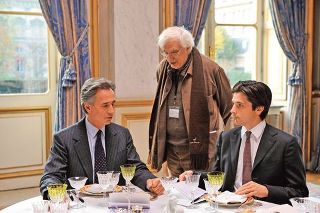
Tavernier directing THE FRENCH MINISTER/QUAY D'ORSAY
Rendez-Vous with French Cinema 2014 complete lineup announced
[Film Society of Lincoln Center press release.]
SERIES LAUNCHES WITH EMMANUELLE BERCOT’S ON MY WAY, WITH STAR CATHERINE DENEUVE IN PERSON ON OPENING NIGHT. CLOSING NIGHTSELECTION IS BERTRAND TAVERNIER’S THE FRENCH MINISTER
IN-PERSON APPEARANCES ALSO INCLUDE BERTRAND TAVERNIER, SÉBASTIEN BETBEDER, SERGE BOZON, GUILLAUME BRAC, JACQUES DOILLON, MICHEL GONDRY,FRANÇOIS OZON, THIERRY DE PERETTI, KATELL QUILLÉVÉRÉ, AXELLE ROPERT, JEAN-PAUL SALOMÉ, JUSTINE TRIET, NABIL BEN YADIR, REBECCA ZLOTOWSKI
Films, Descriptions & Schedule
Main Venues: BAMcinématek (BAM)/Elinor Bunin Munroe Film Center (EBM)/
IFC Center (IFC)/Walter Reade Theater (WRT)
Opening Night: The Paris Theater (PARIS)
(Following are the Film Society of Lincoln Center blurbs.)
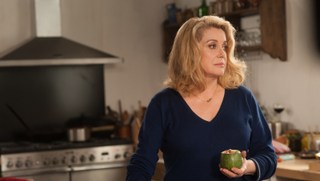
OPENING NIGHT
ON MY WAY (ELLE S'EN VA)
Emmanuelle Bercot, France, 2014, 113m
In French with English subtitles
Catherine Deneuve plays against type and delivers a performance unlike any other in her legendary career as Bettie, a former Breton beauty queen turned bistro owner, in Emmanuelle Bercot’s fourth feature. When her mother (Claude Gensac) tells her that her married lover has ditched her for a 25-year-old beautician’s assistant, Bettie takes to the road with no particular destination in mind and eventually winds up at a dive bar named Le Ranch, where an evening of drunken revelry sets the stage for much tomfoolery to come. Bettie’s resentful daughter Muriel (French pop musician Camille) then asks her mother to chauffeur her son Charly (Nemo Schiffman) to his grandfather’s, and the pair sets out on a trip that will ultimately lead Bettie to revisit her past even as she travels further away from it. Nominated for two 2014 César Awards: Catherine Deneuve (Best Actress) and Nemo Schiffman (Most Promising Actor). A Cohen Media Group release. 18 Sept. 2013 French relesase. Allociné: 4.0
Thursday, March 6, 7:30pm – PARIS; Friday, March 7, 6:45pm – BAM; Saturday, March 8, 7:00pm - IFC
In Person: Catherine Deneuve
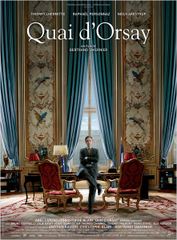
CLOSING NIGHT
THE FRENCH MINISTER (QUAI D’ORSAY)
Bertrand Tavernier, France, 2013, 113m
In French with English subtitles
The veteran auteur Bertrand Tavernier returns to Rendez-Vous with a sly, energetic film about the daily grind of diplomacy. Arthur (Raphaël Personnaz), a graduate of all the right schools, is the new speechwriter for the Minister of Foreign Affairs (a hilarious Thierry Lhermitte). While he tries to navigate internal politics, the various strong personalities around him (such as a ruthless policy advisor played by Julie Gayet), and the stress of finding the Minister’s “voice,” Arthur must also write a speech for the Minister that will hopefully put them both in the history books. Based on co-screenwriter Antonin Baudry’s own graphic novels about his experience working in the Foreign Ministry under former Foreign (and Prime) Minister Dominique de Villepin, The French Minister takes us for a breathless ride through the halls of French government. Nominated for three 2014 César Awards: Julie Gayet (Best Supporting Actress), Niels Arestrup (Best Supporting Actor), and Antonin Baudry, Christophe Blain and Bertrand Tavernier (Best Adapted Screenplay). A Sundance Selects release. 6 November 2013 French release. Allociné: 3.4
Sunday, March 16, 3:40pm, 9:00pm - WRT
In Person: Bertrand Tavernier
2 AUTUMNS, 3 WINTERS (2 AUTOMNES, 3 HIVERS) Filmleaf review
Sébastien Betbeder, France, 2013, 90m
In French with English subtitles
Director Sébastien Betbeder follows his acclaimed debut, Nights With Theodore, with an endearing, inventive romantic comedy, steeped in offbeat charm and an offhand cinephilia. Sad-sack Arman (Vincent Macaigne) first meets Amélie (Maud Wyler) when he bumps into her while jogging; his attempts at connecting with her fail one after the other, until circumstances grant him the opportunity to rescue her from would-be muggers. Thus begins the story of a relationship by turns breezy and momentous. Alongside his longtime friend from art school, Benjamin (Bastien Bouillon), Arman navigates life with his newfound love. Directly addressing the camera and in monologues that comment on their respective situations, these winning characters describe the trajectory of old-fashioned relationships in this millennial age. A Film Movement release. 25 Dec. 2013 French release. Allociné: 3.2
Saturday, March 8, 4:00pm – WRT; Sunday, March 9, 5:30pm - IFC
In Person: Sébastien Betbeder
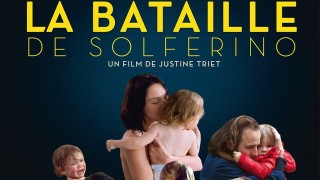
NORTH AMERICAN PREMIERE
AGE OF PANIC (LA BATAILLE DE SOLFÉRINO)
Justine Triet, France, 2013, 90m
In French with English subtitles
During a time of great political change, a frazzled young mother tries to keep it together on the home front. Laetitia (Laetitia Dosch), a cable news reporter off to cover the 2012 French presidential elections, leaves her daughters in the care of a hapless babysitter (Marc-Antoine Vaugeois) with strict instructions to keep them away from Vincent (Vincent Macaigne), her ex-husband and their father. But Vincent, determined to see his kids, disrupts the already chaotic household by enlisting a neighbor to negotiate a divorce agreement with Laetitia – while she’s out reporting amid election crowds in front of Socialist Party headquarters. In her enormously promising first feature, a very funny comedy of discomfort infused with documentary-style energy, director Justine Triet pits micro social problems against the macro body politic of France, all within the frame of one manic day in Paris. Nominated for Best First Film in the 2014 César Awards. 18 Sept. 2013 French release. Allociné: 3.8
Friday, March 7, 6:30pm – WRT; Saturday, March 8, 3:00pm – BAM; Sunday, March 9, 7:30pm – IFC; Monday, March 10, 1:00pm - WRT
In Person: Justine Triet
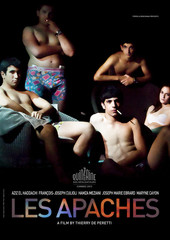
LES APACHES
Thierry de Peretti, France, 2013, 82m
In French with English subtitles
On the island of Corsica, a tension constantly simmers between the wealthy tourists and the working class locals. Aziz and his friends aren’t considering any of this when they break into an empty seaside house, looking for some illicit fun and a pool to lounge beside. But when the owners arrive for their vacation, there are dire consequences for the teenagers, who prove exceedingly easy to track down. Unbeknownst to Aziz, his pals also stole a pair of hunting rifles during the break-in, and might not be as loyal to him as he is to them. An atmospheric thriller simmering with adolescent sexuality, Les Apaches explores aspects of French culture that the mainstream cinema often ignores. The title refers to the slang term used by Paris police for juvenile delinquents, and the film, whose young characters are of Arab and Moroccan descent, narrows in on the subject of racial tension with considerable intelligence and nuance. 14 Aug. 2013 French release. Allociné: 3.4.
Monday, March 10, 12:00pm – EBM; Tuesday, March 11, 6:30pm – WRT; Wednesday, March 12, 7:00pm - IFC
In Person: Thierry de Peretti
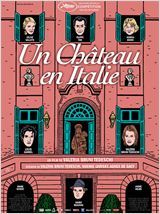
A CASTLE IN ITALY (UN CHÂTEAU EN ITALIE) Filmleaf review
Valeria Bruni Tedeschi, France, 2013, 104m
In English, French and Italian with English subtitles
Valeria Bruni Tedeschi’s semi-autobiographical third feature — her first film since the acclaimed Actresses (2007) — is as restless as the character she plays in it. The actress-director-screenwriter (she co-wrote the film with Noémie Lvovsky and Agnès de Sacy) crafts a sad, whimsical and tender portrait of a family whose glory days are over, and who must confront some ugly facts about their present reality: financial troubles, a younger brother dying of AIDS, a sprawling estate they can no longer maintain. Louise (Bruni Tedeschi) herself is approaching her mid 40s, and wants desperately to have a child and find enduring love. This boldly self-revealing, possibly cathartic work draws both directly and obliquely from Bruni Tedeschi’s real life: Louis Garrel, her former partner, plays Nathan, her young French lover; Nathan's father in the film is a renowned filmmaker who directs his son, as does Garrel’s father, Philippe; and Valeria’s own mother, pianist Marisa Borini, simply plays herself. Marisa Borini is nominated for Best Supporting Actress at the 2014 César Awards. 30 October 2013 French release. Allociné press rating: 3.3.
Monday, March 10, 6:00pm – IFC; Thursday, March 13, 9:00pm – WRT; Sunday, March 16, 6:30pm - WRT
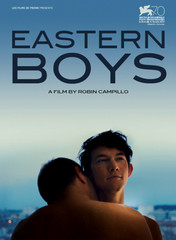
EASTERN BOYS
Robin Campillo, France, 2013, 128m
In English, French and Russian with English subtitles
Arriving from all over the Eastern Bloc, the men who loiter around the Gare du Nord train station in Paris are scraping by however they can, forming gangs for support and protection, ever fearful of being caught by the police and deported. When the middle-aged, bourgeois Daniel (Olivier Rabourdin) approaches a boyishly handsome Ukrainian who calls himself Marek for a date, he learns the young man is willing to do anything for some cash. What Daniel intends only as sex-for-hire begets a home invasion and then an unexpectedly profound relationship. The drastically different circumstances of the two men’s lives reveal hidden facets of the city they share. Presented in four parts, this absorbing, continually surprising film by Robin Campillo (director of Les Revenants and a frequent collaborator of Laurent Cantet’s) is centered around relationships that defy easy categorization, in which motivations and desires are poorly understood even by those to whom they belong. 9 April 2014 coming French release. This won best film in the 70th Venice Film Festival’s Orizzonti section
Tuesday, March 11, 9:00pm – WRT; Wednesday, March 12, 1:00pm – WRT; Wednesday, March 12, 9:00pm - IFC
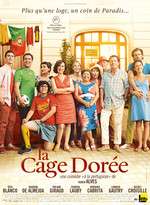
NORTH AMERICAN PREMIERE
THE GILDED CAGE (LA CAGE DORÉE)
Ruben Alves, France/Portugal, 2013, 95m
In French and Portuguese with English subtitles
José (Joaquim de Alameida) and Maria (Rita Blanco), a middle-aged Portuguese couple, have been living in Paris for 30 years. He is a respected construction foreman and she is the concierge at the ritzy apartment building where they live in a cramped ground-floor flat. Their life has been a fulfilling one, with a grown daughter and a teenage son who have spent their lives in France. But when José inherits the family winery and the opportunity to finally return home becomes tantalizingly within reach, they begin to question the level of comfort they’ve achieved and whether it all has been worth the cost. Alves’s immensely likable semi-autobiographical comedy-drama features a sprawling cast of oddballs and mixes farcical situations with razor-sharp observations about class and generational differences and the difficulty of balancing family and work. Nominated for Best First Film at the 2014 César Awards. 24 April 2013 French release. Allociné press rating: 3.5.
Sunday, March 9, 9:30pm - WRT; Tuesday, March 11, 6:00pm – IFC; Saturday, March 15, 7:15pm - WRT
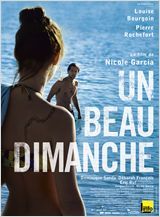
US PREMIERE
GOING AWAY (UN BEAU DIMANCHE)
Nicole Garcia, France, 2013, 95m
In French with English subtitles
Veteran director-actress Nicole Garcia’s refreshingly understated seventh feature follows the formation of an improbable bond between Baptiste (Pierre Rochefort), a commitment-averse substitute teacher, and Mathias (Mathias Brezot), a young student emotionally neglected by his separated parents. Filling in as a temporary surrogate father for Mathias, Baptiste soon finds himself entangled with Mathias’s hard-working, hard-partying mother, Sandra (Louise Bourgoin). When a couple of thugs show up to collect an outstanding debt, the chivalrous Baptiste takes it upon himself to resolve the conflict. Full of sharply and empathetically drawn characters (embodied by an excellent cast, including Dominique Sanda as Baptiste’s mother), Garcia’s intimate film also speaks profoundly about the responsibilities bound up in the connections people forge. 5 February 2014 release. Allociné press rating: 3.6.
Friday, March 7, 6:00pm – IFC; Monday, March 10, 4:00pm – EBM; Saturday, March 15, 9:30pm - WRT
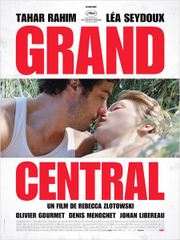
GRAND CENTRAL
Rebecca Zlotowski, France/Austria, 2013, 94m
In French with English subtitles
A nuclear power plant serves as the setting for a forbidden romance as volatile as the facility itself in the intense, brilliantly acted second feature from Rebecca Zlotowski (Belle Epine). Gary (A Prophet's Tahar Rahim) is a poor, unskilled laborer looking for easy money and a place to fit in. Karole (Léa Seydoux) is the fiancée of longtime plant employee Toni (Denis Ménochet), one of the many underpaid men and women who daily brave illness and possible death from radiation poisoning. Soon Gary and Karole fall rapturously in love, and their moonlit trysts in the bucolic surrounding countryside pose a growing threat to the staff's tight-knit bonds. Zlotowski focuses both on the everyday routines of the workers and on the swooning passions of the love triangle at the film’s heart, with electronica pulsating on the soundtrack as her characters gamble ever more perilously in work and love. Olivier Gourmet is nominated for Best Supporting Actor at the 2014 César Awards. 28 August 2013 French relese (Cannes competition). Allocine press rating: 3.9.
Friday, March 7, 9:00pm – WRT; Saturday, March 8, 4:45pm – IFC; Sunday, March 9, 4:30pm – BAM; Monday, March 10, 3:30pm - WRT
In Person: Rebecca Zlotowski
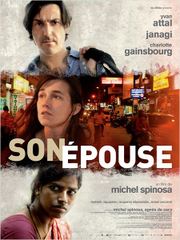
NORTH AMERICAN PREMIERE
HIS WIFE (SON ÉPOUSE)
Michel Spinosa, France/India/Belgium, 2014, 108m
In English, French and Tamil with English subtitles
In Michel Spinosa’s emotional, superbly acted drama, a widower named Joseph (Yvan Attal) travels to India to meet Gracie (Janagi), a young Tamil newlywed who knew his late wife, Catherine (Attal's real life longtime partner Charlotte Gainsbourg), and whose erratic behavior suggests that she may be possessed by the dead woman. Soon enough, Joseph’s journey to the small village near Pondicherry where Gracie lives unveils itself to be not only a form of tribute to Catherine but also a bid for forgiveness. Spinosa (who co-wrote Rendez-Vous 2013 selection Renoir) coaxes magnetic, complex performances from Attal and especially Janagi, who is a revelation as a woman under the influence – of grief and even more mysterious forces. French release coming 12 March 2014.
Friday, March 7, 10:15pm – IFC; Wednesday, March 12, 1:00pm – EBM; 6:30pm – WRT
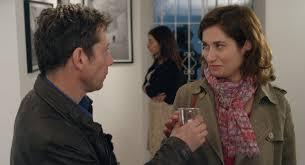
NORTH AMERICAN PREMIERE
IF YOU DON'T, I WILL (ARRÊTE OU JE CONTINUE)
Sophie Fillières, France, 2014, 102m
In French with English subtitles
Mathieu Amalric and Emmanuelle Devos are Pierre and Pomme, a couple whose marriage is on the verge of collapsing. As Pierre goes through the motions of his daily routine while hardly disguising his anger, a bewildered Pomme slowly absorbs all the signs of impending crisis, searching for ways to reconnect with her partner. “We don’t dance anymore, we grow old,” she complains, before pulling Pierre onto the dance floor at a party. But their attempts to rekindle the passion are inevitably, sometimes comically, thwarted. Can they redefine their relationship or will they end up going their separate ways? During one of their weekend hikes, Pomme reaches a breaking point and decides, quite literally, to get lost. With wry humor and great delicacy, director Sophie Fillières (Gentille) crafts an intimate portrait of a pivotal moment in a long-term relationship. Fillières has worked before with Emmanuelle Devos (Ouch, Gentille [R-V 2006]). French release coming 5 March 2014.
Friday, March 7, 3:45pm – WRT; Monday, March 10, 10:15pm – IFC; Saturday, March 15, 5:00pm - WRT
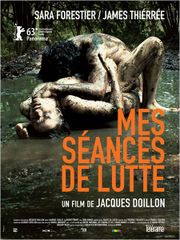
NORTH AMERICAN PREMIERE
LOVE BATTLES (MES SÉANCES DE LUTTE)
Jacques Doillon, France, 2013, 99m
In French with English subtitles
“All my strength, all the force of my love… if I heaped it on you, I’d demolish you”: Jacques Doillon’s latest is a bruising investigation into the fault lines that both separate and connect eroticism and violence. James Thiérrée (an acrobat and performance artist, and also Charlie Chaplin’s grandson) and Sara Forestier play Lui and Elle (“Him and Her”), almost-lovers unable to get on the same page, psychosexually speaking. In regular meetings they strive to resolve the impasse (or perhaps, just to expend pent-up energy) through no-holds-barred wrestling matches. Their “battles” grow in frequency and force, testing the lovers’ bodies as much as their souls. Doillon’s camera captures the astonishing physicality of their lengthy struggles less as a voyeur than as a third, invisible combatant. And as the film intensifies, it evolves from a metaphoric exploration of the nature of human sexuality into something far more visceral and affecting. An Adopt Films release. 6 November 2013 French release. Allociné press rating: 3.5.
Sunday, March 9, 7:30pm – BAM; Monday, March 10, 6:30pm – WRT; Tuesday, March 11, 8:00pm - IFC
In Person: Jacques Doillon
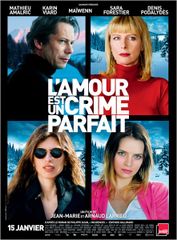
US PREMIERE
LOVE IS THE PERFECT CRIME (L’AMOUR EST UN CRIME PARFAIT)
Arnaud and Jean-Marie Larrieu, France/Switzerland, 2013, 110m
In French with English subtitles
It’s good to be Marc. Played by the reliably terrific Mathieu Amalric, he holds a prestigious teaching position at what must be the world’s most beautiful university and is desired by seemingly every comely coed in the Swiss Alps. But this idyllic existence goes awry the morning after, when his latest undergraduate conquest vanishes. Suddenly, it’s not so good to be Marc. A detective begins snooping around and asking questions. Marc’s supervisor, who has a thing for Marc’s sister (whose affections for Marc appear more than familial), informs him that his position may no longer be secure. A sexy student from a prominent family wishes to supplement her education with some extracurricular instruction. And then there’s the matter of the missing coed’s gorgeous stepmother… Everything comes together in this darkly funny thriller with an explosive finale from Arnaud and Jean-Marie Larrieu. 15 January 2014 French release. Allociné press rating: 3.2.
Friday, March 7, 1:00pm – WRT; Sunday, March 9, 9:30pm – IFC; Monday, March 10, 9:15pm - WRT

NORTH AMERICAN PREMIERE
THE MARCHERS (LA MARCHE)
Nabil Ben Yadir, France/Belgium, 2013, 120m
In French and Arabic with English subtitles
Nabil Ben Yadir’s rousing sophomore feature reconstructs a decisive event in the history of French racial politics: a Mitterand-era demonstration in which nine people marched 930 miles for equality and against racism from Marseilles to Paris, where they were met by more than 100,000 supporters. Compelled to undertake their cross-country trek when Mohamed (Tewfik Jallab) and Hassan (Jamel Debbouze) are victimized by the police, the band of protestors—inspired by Martin Luther King, Jr. and Gandhi—have their resolve tested, but are obliged to soldier on when a Maghrebi teenager is brutally murdered and as they encounter ever more prejudice en route. The Marchers is a monument to the courage of a handful of activists as well as an edifying account of how a small group can bring about enormous shifts in the national consciousness. 27 November 2013 French release. Allociné press rating: 3.4.] With Olivier Gourmet.
Saturday, March 8, 9:45pm – IFC; Sunday, March 9, 1:30pm – WRT; Friday, March 14, 3:30pm - EBM
In Person: Nabil Ben Yadir
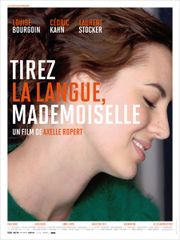
MISS AND THE DOCTORS (TIREZ LA LANGUE, MADEMOISELLE) Filmleaf review
Axelle Ropert, France, 2013,100m
In French with English subtitles
Sibling doctors Boris (filmmaker Cédric Kahn, in a revelatory performance) and Dimitri (Laurent Stocker) share a pediatric practice in a working-class Paris arrondissement. But their fraternal bonds and professional relationship are tested when they take on a young diabetic patient and both fall for the girl’s lovely mother (Louise Bourgoin), who tends bar at a local watering hole. The possibility of sharing a life with this woman and her daughter represents something quite different for each brother, and director Axelle Ropert (The Wolberg Family) places their burgeoning rivalry at the heart of this witty, passionate, beautifully observed drama. The cinematography by Céline Bozon (the sister of Tip Top director Serge) gives the urban setting, with its high-rise apartment blocks and Chinese restaurants, a sense of everyday magic, as does Benjamin Esdraffo’s lilting score. 4 Sept/ 2013 French release. Allociné press rating 3.6.
Saturday, March 8, 1:00pm – WRT; Sunday, March 9, 1:00pm – IFC; Monday, March 10, 1:50pm - EBM
In Person: Axelle Ropert
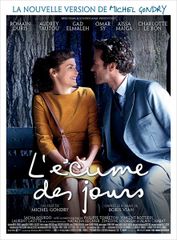
MOOD INDIGO (L’ÉCUME DES JOURS)
Michel Gondry, France/Belgium, 2013, 95m
In English and French with English subtitles
Eminently inventive Michel Gondry finds an ideal counterpart in Boris Vian, whose novel Foam of the Daze provides the foundation for this manic, visionary love story. Romain Duris plays wealthy bachelor Colin, whose hobbies include developing his pianocktail (a cocktail-making piano) and devouring otherworldly dishes prepared by his trusty chef Nicolas (Omar Sy). When Colin learns that his best friend Chick (Gad Elmaleh), a fellow acolyte of the philosopher Jean-Sol Partre, has a new American girlfriend, our lonely hero attends a friend’s party in hopes of falling in love himself. He soon meets Chloé (Audrey Tautou) and, before they know it, they’re dancing to Duke Ellington and plunging headfirst into a romance that Gondry rapturously depicts as only he can. Nominated for three 2014 César Aw 24 April 2013ards: Étienne Charry (Best Original Music), Florence Fontaine (Best Costume) and Stéphane Rozenbaum (Best Production Design). A Drafthouse Films release. [B]Frenh release , Allociné press rating: 3.0.
Sunday, March 9, 7:00pm - WRT; Monday, March 10, 8:00pm – IFC; Monday, March 10, 9:30pm - BAM
In Person: Michel Gondry
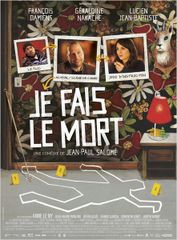
NORTH AMERICAN PREMIERE
PLAYING DEAD (JE FAIS LE MORT)
Jean-Paul Salomé, France/Belgium, 2013, 104m
In French with English subtitles
In Jean-Paul Salomé’s seventh feature, the hilarious François Damiens plays Jean, a down-and-out and underemployed actor (not to mention a former César winner!) who, after years of playing tiny roles on canceled TV shows and starring in embarrassing commercials, takes a gig as a performer in a homicide reenactment “produced” by the police at a ski resort in the French Alps. Being an expert at unnecessarily complicating or otherwise ruining any situation in which he finds himself, Jean quickly gets in the way of the case’s chief investigator (Géraldine Nakache), sparking an antagonism-turned-romance as well as a suspenseful whodunit rich with twists, turns and amusing instances of Jean taking himself much too seriously. Filming the reenactment as though it were a movie shoot, Salomé slyly juxtaposes the worlds of forensics and filmmaking, and the result is a rare, uproarious murder mystery. 11 December 2013 French release. Allociné press rating: 2.9.
Saturday, March 8, 6:00pm – BAM; Saturday, March 8, 9:00pm – WRT; Sunday, March 9, 3:15pm – IFC; Friday, March 14, 1:00pm - EBM
In Person: Jean-Paul Salomé
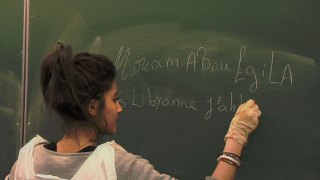
NORTH AMERICAN PREMIERE
SCHOOL OF BABEL (LA COUR DE BABEL)
Julie Bertuccelli, France, 2013, 89m
In French with English subtitles
At a secondary school in Paris’s 10th arrondissement there is a “reception class,” where students between the ages of 11 and 15 are taught their first lessons in French. Some of these immigrant children, newly arrived, know a few phrases in the language of their adopted country; others can’t speak a word. Their families have come from all across the globe, from Ireland, Senegal, Morocco, Brazil, and China, fleeing persecution or just looking for a fresh start. Shot over a year, this observational documentary by Julie Bertuccelli (Since Otar Left, The Tree) is a kind of non-fiction counterpart to Laurent Cantet’s Palme d’Or-winning The Class, staying within the confines of the school and recording the children’s candid, sometimes heated discussions and interactions between parents and teachers. The result is both illuminating and extremely touching, a multifaceted look at the French melting pot, its frustrations and its hopes for the future. French release 12 March 2014.
Saturday, March 8, 12:45pm – IFC; Sunday, March 16, 1:30pm - WRT Coming March 12 release in France.
SUZANNE (2013) Filmleaf review
Katell Quillévéré, France, 2013, 94m
In French with English subtitles
A coming-of-age story takes on epic proportions in Katell Quillévéré’s follow-up to her lauded debut, Love Like Poison. Suzanne (first played by Apollonia Luisetti and then by Sara Forestier) is a wild child who becomes a mother at 15 and takes up with a local bad boy not long after. Through it all, her widowed father (comic actor François Damiens, in a rare dramatic role) and older sister (Fanie Zanini and Adèle Haenel) try their best to keep the family together. Brilliantly acted, especially by Forestier, Damiens and Haenel, Quillévéré’s film, which compresses some 25 years into an hour and a half, proceeds at a furious pace, episodically and elliptically. What sounds melodramatic on paper is never less than urgent and compelling on screen: each decisive moment in this family saga lands with tremendous emotional force. Nominated for five 2014 César Awards: Sara Forestier (Best Actress), Adele Haenel (Best Supporting Actress), François Damiens (Best Supporting Actor), Paul Hamy (Most Promising Actor), and Katell Quillévéré and Mariette Désert (Best Original Screenplay). French release 18 December 2013, Allociné press rating: 4.1.
Saturday, March 8, 2:30pm – IFC; Sunday, March 9, 4:30pm – WRT; Wednesday, March 12, 4:00pm - EBM
In Person: Katell Quillévéré
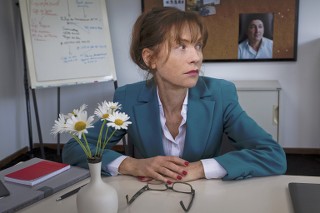
NORTH AMERICAN PREMIERE
TIP TOP Filmleaf review
Serge Bozon, France/Luxembourg/Belgium, 2013, 106m
In French and Arabic with English subtitles
Co-written with Axelle Ropert (also featured in this year’s Rendez-Vous with Miss and the Doctors), Bozon’s much-anticipated follow-up to 2007’s La France is a one-of-a-kind screwball procedural adapted from a pulp novel by Welsh writer Bill James. Meticulous and eccentric internal-affairs investigator Esther (Isabelle Huppert) and her mousy new partner Sally (Sandrine Kiberlain), recently demoted due to a mysterious ethics violation, are summoned to look into the Villeneuve police department after the murder of an Algerian informant. As entanglements ensue with belligerent local detective Mendès (a very funny François Damiens), Bozon throws together seemingly mismatched elements with aplomb: exploring the women detectives’ sexual kinks even as he comments on racism and postcolonial tensions. In keeping with its director’s background in criticism, Tip Top is an exploration of policier tropes but also a bold, strange, often delightful film that looks, sounds and moves like nothing else in its genre(s). A Kino Lorber release. French release date 11 Sept. 2013, Allociné press rating: 3.1.
Thursday, March 13, 9:30pm – IFC; Friday, March 14, 1:00pm, 9:00pm - WRT
In Person: Serge Bozon
TONNERRE
Guillaume Brac, France, 2013, 100m
In French with English subtitles
Struggling musician Maxime (Vincent Macaigne) moves back to the titular provincial town (which means thunder in French) to live with his father and work on some new songs. But soon he meets Mélodie (Solène Rigot), a beautiful journalist more than a decade his junior. As their fling progresses to full-on enthrallment in a matter of days, all Maxime’s interests become secondary to spending time with Mélodie. Just as suddenly as their relationship began, she texts him a farewell and cuts off all contact. The quaint pleasures and understated tone of the early scenes slowly morph into something resembling a thriller, and as Maxime's longing transforms into obsession, a palpable dread sets in. Director Guillaume Brac previously collaborated with Macaigne on the acclaimed medium-length film A World Without Women (2011). Tonnerre, Brac’s feature-length debut, is darker and more troubling, a complex and engrossing character study with a brilliantly modulated performance by Macaigne at its center. French release date 29 January 2014, Allociné press rating: 3.6.
Wednesday, March 12, 4:00pm – WRT; Thursday, March 13, 7:00pm – IFC; Friday, March 14, 6:30pm - WRT
In Person: Guillaume Brac

UNDER THE RAINBOW (AU BOUT DU CONTE)
Agnès Jaoui, 2013, France, 112 minutes
In French with English subtitles
Twenty-four-year-old Laura (Agathe Bonitzer) has faith that someday her Prince Charming will suddenly appear. But when such a man does turn up, so does another one — charming in a different way, but equally alluring. In a flash, all of Laura’s assumptions about life and the future become fairy dust. Under the Rainbow is a contemporary fairy tale with more than its share of twists, imbued with the sharp existentialist humor we have come to expect from the duo of Agnès Jaoui and Jean-Pierre Bacri (The Taste of Others, Look at Me). Both once again collaborate on the script and co-star as Pierre and Marian, a comically neurotic middle-aged pair [they aren’t a romantic couple in the film] who, despite being a generation older than Laura, face a similar predicament: how to lead their lives in relation to their sometimes wild dreams and expectations. 6 March French release. Allociné: 3.5
Tuesday, March 11, 10:15pm – IFC; Wednesday, March 12, 9:00pm – WRT; Friday, March 14, 3:45pm - FSLC

YOUNG AND BEAUTIFUL (JEUNE ET JOLIE)
François Ozon, France, 2013, 95m
In French and German with English subtitles
“No one’s serious at 17,” wrote Arthur Rimbaud. For Isabelle (Géraldine Pailhas), the 17-year-old at the center of François Ozon’s Young & Beautiful, this sentiment may justify the choices she makes over the course of a pivotal year. Divided into four seasons, Isabelle’s foray into prostitution is motivated not by a need for money or control, but rather by an overwhelming desire for self-discovery. Ozon observes her journey without judgment, reflecting on the emotions and insecurities that saturate a young person’s entrance into adulthood. One year removed from In the House (Rendez-Vous ’13), Ozon again proves a master at coaxing strong performances from young actors; Marine Vacth, in her first leading role, is a revelation. Nominated for two 2014 César Awards: Géraldine Pailhas (Best Supporting Actress) and Marine Vacth (Most Promising Actress). A Sundance Selects release. 21 August 2013 French release. Allociné: 3.7
Friday, March 7, 8:00pm – IFC; Saturday, March 8, 6:30pm – WRT; Saturday, March 8, 9:00pm - BAM
In Person: François Ozon
Last edited by Chris Knipp; 01-01-2015 at 01:06 PM.
-
Emmanuelle Bercot: ON MY WAY (2013)
EMMANUELLE BERCOT: ON MY WAY (2013)
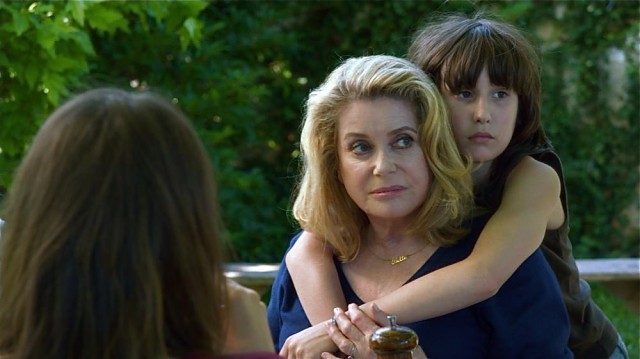
CATHERINE DENEUVE, NEMO SCHIFFMAN IN ON MY WAY
Deneuve goes wandering in rural France
On My Way is a little French road movie starring Catherine Deneuve. She plays Bettie, a former Miss Brittany (from 1969 ) who runs a provincial restaurant that's in financial trouble. Bettie goes on a "fugue" and wanders along country roads away from the autoroute in her Mercedes after learning her married lover has left his wife -- not for her but for a young woman training to be a beautician. Along the way she consents to pick up her seldom seen 11-year-old grandson Charly (Nemo Shiffman, son of the director and of d.p. Guillaume Schiffman [The Artist]) and take him to his grandfather while his mom goes to Belgium for a job. This isn't a great movie, but it's easy to watch, especially if you're a fan of the mature Deneuve. Those who think of her as a beauteous but off-putting "ice queen" must not have seen the more than half her oeuvre she's made since turning forty. These films display a mellower, more soulful woman than the stiff beauty who memorably starred in Donkey Skin, Belle de Jour, or The Umbrellas of Cherbourg. Though she has been in over a hundred films, Deneuve may never have been in one quite like this. More often recently she has tended to prefer to be in ensemble pieces like Desplechin's A Christmas Tale of Honoré's Beloved. Here with many locations and many characters, she remains constantly at the center.
A small film with Deneuve the focus of every scene can't fail to be permeated by her distinctive aura, however much it is a "departure" from her usual more regal or elegant roles. As in any road movie, she is acted upon; things happen to her. First, the shocking revelation about her boyfriend, which she gets from her aged, but still lively mother (Claude Gensac), whom she lives with, in the house where she was born, and who runs the cash register of the restaurant. (Deneuve's own mother lives near her in Paris, on her own at over 100.) They have words, and the next day at lunch, Bettie gets in her car and "s'en va," goes off. The film refers to Deneuve's own attributes, notably her famous beauty and her love of smoking. She's not only a former beauty queen, but even takes Charly to a reunion of other French regional beauty queens for her year. Having gone back to smoking after the shock of being dumped, she runs out of cigarettes right away, and this leads to a comic scene with an old farmer (Pierre Toulgoat) who takes forever to roll her one, and a sexual adventure, when Marco (Paul Hamy), a rakish young dealer in contraband cigarettes at a road house called Le Ranch, falls in love with her, gets drunk with her, and takes her to bed at a motel.
The scene at the distinctly déclassé Le Ranch, where Bettie is adopted by a gaggle of local woman as well as Marco, is a prime and memorable example of the kind of environment you don't usually find in Catherine Deneuve's work with Téchiné or Desplechin. To begin with French high-art films tend to be set in Paris, and this is as non-Paris as you can get, way more kitsch, and way more friendly.
Little Charly is preconditioned by his mother to dislike Bettie, and when her credit card is refused at a roadside shop he runs off, but they bond, and he comes to adore her and will not accept the idea of her leaving when they find his grandfather. Feisty and hyperactive, Nemo Shiffman, who's been nominated for a César like Deneuve, nonetheless has a lightness in his performance that contributes to the film's humor and charm.
Things turn almost Hollywood-French toward the end, with accordion music, sing-alongs, and a big family and neighborhood summer gathering for wine and food en plein air. Bettie's daughter, Charly's mother Muriel, played none-too-subtly by French singer Camille, shows up unexpectedly at granddad's house in southeastern France, having already washed out in her Belgian job, and dives into a a loud rant against Bettie that ends in tears and hugs. Most clichéd and audience-pandering of all, Charly's grandfather (Gérard Garouste), a handsome old chap who's the town's well-heeled outgoing mayor, falls for our star, and two kids run off-screen happily chanting "live goes on." All of which signals that On My Way is not only entertaining but a humanistically life-affirming little picture. But Renoir and Ozu's laurels remain challenged. This has memorable bits. It's no classic.
But Emmanuelle Bercot isn't a director noted for conventional crowd-pleasers. She's an actress with a recent credit in the docu-realistic social commentary feature Polisse, and her first important directorial effort was a film where she stared as a women who gets romantically involved with a teenage boy. On My Way is an offbeat Valentine to beautiful aging women and Deneuve in particular. It runs on a little too long and has a too-conventional happy ending, but it has rough edges and real stuff too, and through odd incidents and a use of non-actors pretty neatly avoids being boiler-plate art house pap. Catherine Deneuve remains impressive at seventy, beautiful, zoftig, a smoker, able to lend a glow to any scene she's in without marring its authenticity.
On My Way/ Elle s'en va, 113 mins., debuted in competition at the Berlinale in Feb. 2013. Screened for this review as part of the Rendez-Vous with French Cinema at Lincoln Center, where it was scheduled as the opening night film. It opened in French cinemas 18 Sept. 2013, to a very positive critical reception (Allociné press rating 4.0). Regular US theatrical release began in NYC Friday 14 March 2014 at Lincoln Plaza Cinemas.



. . . . March 6 – 16, 2014
Last edited by Chris Knipp; 01-02-2015 at 01:14 PM.
-
Arnaud and Jean-Marie Larrieu: LOVE IS THE PERFECT CRIME (2013)
ARNAUD AND JEAN-MARIE LARRIEU: LOVE IS THE PERFECT CRIME/L'AMOUR EST UN CRIME PARFAIT (2013)
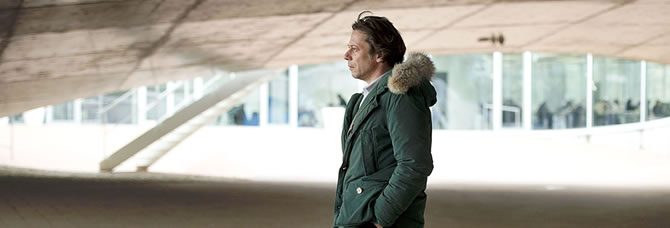
MATTHIEU AMALRIC IN LOVE IS THE PERFECT CRIME
Getting away with murder -- almost
In this coldly handsome-looking and vaguely preposterous film by Arnaud and Jean-Marie Larrieu, Matthieu Amalric plays Marc, who has a popular seminar in writing at the sleek, glass-encased University of Lausanne between Switzerland and France. Marc is an academic Lothario who's slept with so many of his female students he can't keep their names straight. One of them, whom he's just taken to bed in the family chalet he shares with his borderline-incestuous sister Marianne (Karin Viard), turns out to be missing afterward and he's an obvious suspect. But his relations with the cop sent to investigate remain cordial and, in plain view, he begins meeting and eventually sleeping with Anna (Maiwenn), the stepmother of the missing Barbara (Marion Duval). Meanwhile an oversexed student called Annie (Sara Forestier) keeps throwing herself at him, and Richard (Denis Podalydès), Marc's department head, whom he detests, is either protecting Marc or trying to get rid of him; it's not always clear. What becomes clear is that Richard and Marianne have something going on. Marc sleepwalks, or talks in his sleep, and imagines things.
L'amour est un crime parfait (the French title) has pretensions, but little discernible rhythm; therefore Rob Nelson's linking the film in his Variety review to Hitchcock seems over-optimistic. It could be both a thriller and a sharp psychological study, but fails to score in either category, until the thriller part does come together at the end as several revelations and a nifty finale take place. But unfortunately credibility and involvement have been lost long before these engaging moments come.
The able Amalric does the best he can with weak material here, particularly scenes of his teaching, which are hopelessly lame and repetitive. All he does is throw out overly-famous quotations from James Joyce, Dante, and the like and assign in-class writing assignments that would seem unoriginal in high school. Students never get to talk, papers never have to be graded or discussed. These moments are a strong clue that this film, so elegant to look at and full of intriguing surreal touches, is too often more half-hearted gesture than solid maatter. Amalric is saddled with strutting, pretentious dialogue as a teacher. His character's enormous appeal to girl students is a mystery. He's an actor who's most effective in troubled, neurotic (or even deranged) or hyperactive roles and it's hard to see him as a dodgy ladykiller. But the Larrieus, adapting Phillippe Djian's novel Incidences, eschew straightforward realism. Their film is elegant, and on the dark side, but also playful and tongue-in-cheek. Its shots of a snow-shrouded alpine road, Marc skiing and climbing, the handsome chalet, and above all the coldly spectacular university are highlights of a handsome and highly accomplished mise-en-scène, and even the opening credits are a pleasure to look at, but all that tends to overwhelm the story. I haven't seen the Larrieus' other films, two of which, Happy End and A Man, a Real One, Amalric already starred in. I therefore can't confirm or deny some French critics' assertion that in the light of that oeuvre, this film makes brilliant sense.
Love Is the Perfect Crime/L'amour est un crime parfait, 110 mins., debuted at Toronto 2013 and opened in France January 14, receiving mixed reviews (Allociné press rating a very so-so 3.2). Screened for this review as part of the Rendez-Vous with French Cinema at Lincoln Center (March 6-16, 2014).
Last edited by Chris Knipp; 01-02-2015 at 01:18 PM.
-
Sophie Fillières: IF YOU DON'T I WILL (2014)
SOPHIE FILLIÈRES: IF YOU DON'T, I WILL (2014)
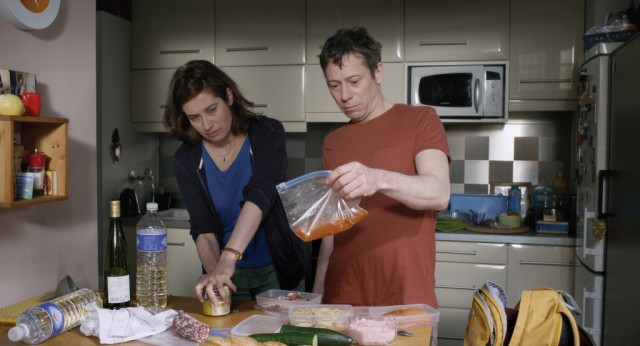
EMMANUELLE DEVOS AND MATTHIEU AMALRIC IN IF YOU DON'T I WILL
A squabbling couple
The prolific Matthieu Amaric, seen also at the Lincoln Center 2014 French film series in the Larrieu brothers' Love Is the Perfect Crime as a strutting professorial Lothario, becomes more of an everyman in Sophie Fillières' quirky study of a disintegrating marriage in Lyon, Arrête ou je continu. (It's been given the English title If You Don't, I Will.). This is the third performance for Fillières by Emmanuelle Devos, who plays Pomme, the disappointed wife of Pierre (Amalric). The others were Aïe/Ouch (2000) and Gentille (2005), the latter clearly a more interesting film, meandering and oddball, like this one, but blessed by the presence of not only Bruno Todeschini but the legendary actors Michel Lonsdale and Bulle Ogier. Here the cast is augmented only by a mountain goat. One feels the lack, and Pomme's long "fugue" in the park, which fills much of the film, is a dreary interlude. As the reviewer of this film for aVoir-aLire.com says, it begins with energy but "gets lost in the forest." Both Amaric and Devos have arguably had a great deal better material in the past. However, one must remember that this is a comedy, and while it may seem like watching paint dry, it does had its droll moments.
Amalric and Devos are no strangers to each other. Arguably the most original French film actors of their generation, they first played a couple 18 years ago in Arnaud Desplechin's distinctive, smart early film, Comment je me suis disputé... (ma vie sexuelle)/My Sex Life... or How I Got Into an Argument. They have appeared together as a couple no less than six times now. They're not young anymore: Amaric is 49 and Deovs 50.
In a key scene at a party Pomme tries to drag Pierre out on the dance floor, but he stands there rigid. The comedy: Pomme complains to a female friend "We don't dance anymore," and the friend says "Nobody does." In a comic moment, the couple try to chill a half bottle of champagne using the fridge's "superfrost" button, and it explodes. They toast each other with chunks of ice. "Watch out for glass," says Pierre.
Since Pierre and Pomme's constant squabbling threatens to grow tiresome Fillières splits them up, though her method is the dubious park episode. The two go on an ill-starred hike in a nature preserve and when they fight as usual, Pomme, who's just recovered from treatment for a benign brain tumor and finds this change of venue a shock, chooses to stay behind in the park and lets Pierre go home in the car by himself. And what does she do? She basically sits around. Her cell phone battery goes dead. At one point she takes a break at a small resort hotel, posing as a chamber musician. Then she goes back to the park. Pierre comes to look for her, but the park is large. When she returns home days later on her own, Pierre, who has been frantic, hopes for a reconciliation. But none takes place. Pomme has saved the young chamois that fell into the stone and ground declivity she was sleeping in. She has not saved their marriage. While Pierre seems to have an affair cooking with Mellie (Josephine de la Baume), he and Pomme are still close, making attempts like the hike in the park and regular joint sessions with a trainer. There's just one thing that's lacking now: amour.
The humor and storyline here are not far from the work of Agnès Jaoui with Pierre Bacri. This is particularly seen in an early sequence at a gallery opening. But Fillières has a more delicate touch. Neither Devos nor Amaric has the dryness of that other couple's French humor, nor would Jaoui present a park sequence that was this flat. While the arguments are certainly real-seeming, Fillières doesn't provide any details of Pierre and Pomme's professional lives, and their no longer at home college-age son Romain (Nelson Delapalme), who's brought in a couple of times, is underused. This film seems likely to appeal only to ardent fans of the two actors and the director.
If You Don't, I Will/Arrête ou je continue , 102 mins., debuted in the "Panorama" section of the 2013 Berlinale. It opened in Paris cinemas 5 March 2014 (AlloCiné press rating 3.4, with good ratings from Cahiers and Les Inrocks). Screened for this review as part of the Rendez-Vous with French Cinema at Lincoln Center (6-16 March 2014). US theatrical release NYC (Film Forum) through 30 Dec. 2014. Metacritic rating 68%.
Last edited by Chris Knipp; 02-27-2019 at 12:58 PM.
-
Justine Triet: THE AGE OF PANIC (2013))
JUSTINE TRIET: THE AGE OF PANIC (2013
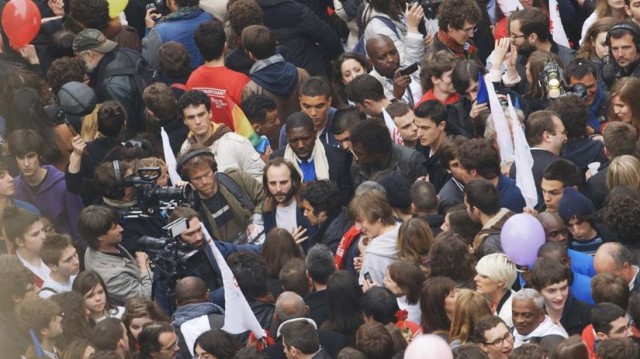
STILL FROM THE AGE OF PANIC (VINCENT MACAIGNE, CENTER)
Upheavals on a Paris day, personal and political
Justine Triet's first feature is a turbulent, boldly integrated and in part highly improvised mashup of two events that take place on the same long day: the squabbles of a divorced couple over the husband's visitation rights to their young daughters, and the climax of the Sarkozy-Hollande French presidential elections. For a little low budget film, this one is surprisingly ambitious and effective. The French title, La Bataille de Solférino ("The Battle of Solferino"), refers to the site of major Paris demonstrations of supporters of the two main candidates on election day May 6, 2012 outside Socialist Party headquarters on the street by that name, but also by association to the smaller but in its way also epic battle between Vincent (French generational cinematic touchstone du jour Vincent Macaigne) and his former wife Laetitia (Laetitia Dosch). She is a TV news reporter who is called out to cover the Rue Solférino excitement, reporting and interviewing participants from both sides. Vincent is a comic and graphic novel artist. Her leaving the two girls with young male babysitter Marc (Marc-Antoine Vaugeois), an aspiring pastry cook, makes it impossible for Vincent legally to visit them. A judge's letter instructs that he must be allowed to see them on the weekend, but only with their mother present. Laetitia blames this contretemps on Vincent, whom she regards as a deadbeat. In a striking proof that the personal is political and vice versa, the babes get dragged to the demo by Marc and Vincent comes following, so everybody has a shouting match. With a keen sense of rhythm and structure, Triet takes the action back to an eventually peaceful finale at Laetitia's apartment, providing a sense of resolution and hope.
Things begin at a fever pitch with Laetitia running around her big disorderly apartment, late for her unexpected call-out to cover the demos, while the two little girls scream and the young babysitter clearly has little on the ball. Vincent is calling, repeatedly, Laetitia's boyfriend Arthur has been there, and Vincent shows up. Laetitia has told Marc he's by no means to let her ex in, or anybody. Marc, overwhelmed, does let Vincent in. Then a neighbor Laetitia has instructed to combat just this eventuality, comes up and forces Vincent out of the flat. Later, the scene shifts to Laetitia in the thick of the crowd doing her reporting. Sound bites follow. Triet takes no political stand. The important thing is the parallel between the politically divided country and the split couple at odds with each other. Citizens love France, the couple loves their kids. But it's all a hyperactive, turbulent mess.
It's hard to imagine how the filmmakers managed not only to shoot the huge gathering of Hollande and Sarkozy supporters in Rue Solférino, sometimes seen from above, and mix it with the specific action of their film, especially when Marc, at Laetitia's instructions, brings the little girls there, and Vincent follows -- all this action taking place amid the teeming thousands of demonstrator-spectators. It's a wonder they didn't lose the kids. But the blend of real and staged events is a tour-de-force that Virgile Dumez of aVoir-aLire.com called "un Véritable "Red Bull" cinématographique," ("a veritable cinematic Red Bull"). That such epic events are so richly covered by Triet in a mere hour and a half is an accomplishment that shows much promise.
Heavy use of improv marks the various encounters in the film, between Laetitia and Vincent, Vincent and Marc, Vincent and his friend, law student, and de factor legal advocate Arthur (Arthur Harari), and toward the end the particularly droll encounter between Laetitia's new squeeze Virgil (Virgil Vernier) and Vincent back at the apartment, in the wee hours now, when Virgil is extraordinarily nice to Vincent -- and they all hug, including Vincent and Laetitia. Macaigne, a dreamy-eyed, sweet-faced and soulful dude with long hair, beard, and balding pate, is the epitome of the lovable nice guy who's not going to get the French equivalent of a job on Wall Street. He is a young everyman whose nature expresses the sweet heart of modern France that might survive racial tension and political polarization.
The Age of Panic/La Bataille de Solférino, 94 mins. Debut Cannes 20 May 2013, French cinemas 18 Sept. Enthusiastic French reviews (Allociné 3.8), especially from the prestigious and often picky Cahiers du Cinéma. I tried to see this film in Paris in Oct. but kept missing it. Screened for this review as part of the 6-16 March 2014 Lincoln Center-UniFrance series, Rendez-Vous with French Cinema.
Last edited by Chris Knipp; 01-01-2015 at 07:20 PM.
-
Rebecca Zlotkowaki: GRAND CENTRAL (2013)
REBECCA ZLOTKOWSKI: GRAND CENTRAL (2013)
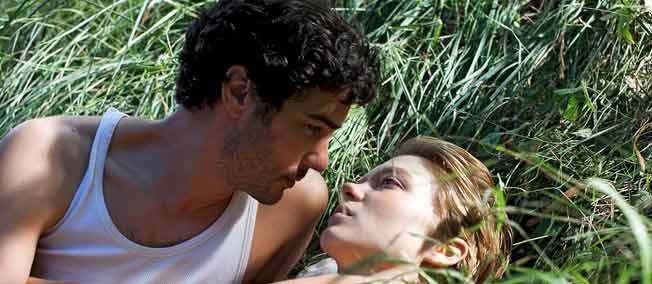
TAHAR RAHIM AND LÉA SEYDOUX IN GRAND CENTRAL
Dangerous love, dangerous work
In her second film Rebecca Zlotkowski works for tension by playing off two kinds of danger. Young Gary Manda (Tahar Rahim) comes to work as a low-level employee at a French nuclear plant. Then he connects with another worker, Karole (Léa Seydoux) and they have a hot affair, despite her being the fiancee of longtime employee Toni (Denis Ménochet). The team leader and promoter of esprit de corps is the loud, dominant Gilles (Olivier Gourmet). Using realistic location scenes and oppressive sound Zlotkowski gives the viewer an intense awareness of the danger of the work, far greater for the working class peons than higher-ups who get a different parking lot, better protection, and of course higher pay. What has this got to do with Gary and Karole? Nothing, really. And a slightly confusing finale points up that things aren't profoundly worked out. Nonetheless the hot love affair is played by hot young French actors of the moment. Gourmet can always be counted on to provide intensity and authenticity. And the less defined other players look right. Zlotkowski has made a good movie. But considering that Rahim debuted in Audiard's A Prophet and also played last year in Farhadi's The Past while Seydoux won a double prize at Cannes for her performance in Blue Is the Warmest Color, Grand Central feels like a relatively minor effort -- despite it too debuting in A Certain Regard at Cannes; a nomination for Gourmet at this year's Césars; and high French critical approval indicated by an Allociné press rating for Grand Central of 3.9 out of 5. But Grand Central has the feel of a good, solid old school American film, and Zlotkowski has cited an admiration for Frankenheimer, Nicholas Ray, and Raoul Walsh.
Grand Central will be remembered for its relentless and troubling concentration of the daily grind of low level nuclear workers whose routine means constant low levels of exposure to dangerous radiation and day-to-day danger of a misstep or accident that may do more serious damage. The radiation level cards the workers are wearing on the job are always ticking. It's not ever a matter of no exposure but of how much. The film starts off Gary and Karole in a flashy scene where in front of Gilles and Toni and all their coworker comrades drinking, she goes up to a standing Gary, just arrived, and gives him a long kiss whose effect of making him scared and nervous and excited and dizzy she declares is just what getting a "dose" (of radiation) feels like. Even long before Gary even goes into the training, in the opening scene of the film action begins at a high pitch with a future coworker picking his pocket on a train and him running angrily after the guy to grab it back.
Effort is made to counteract Tahar Rahim's slight, mild appearance by demonstrating repeatedly that he is fearless and physically strong. Audiard used him the same way but far more richly in A Prophet, introducing his character as a young prisoner who's a virtual virgin in tough jailbird ways -- but he's in for killing a cop, and soon is forced by mafiosos to kills another Arab prisoner, proving his looks are deceptive. An obvious contrast comes in the use of Olivier Gourmet, a big, heavy, blustering man who yet ultimately reveals a sense of hopelessness and defeat. Léa by further contrast seems poorly used here. The same tough edge that fit her role as the older lesbian lover in Blue Is the Warmest Color (and she still seems to have the short-cropped haircut of Kechich's film) makes her neutral and flat in this factory environment where she fits in a bit too well. It's never clear whether Gary and Karole represent a star-crossed love affair or just compulsive young sex.
The two turning points come obviously enough. Karole gets pregnant, and Toni can't father a child (due to radiation it's hinted) so it's obviously not his. Yet Karole pushes on for her and Toni to marry posthaste. Perhaps due to a reckless feeling prompted in him by these events -- the action is too breathless to know -- Gary gets overexposed to radiation and is furloughed from the plant.
The relentless electronic soundtrack suggests the director doesn't fully trust her film or her audience, but it works just the same. If you're responding, you watch in a state of constant tension that the electronics control and buy into the French blub that says "Every day becomes a menace."
Grand Central, 94 mins., scripted by Gaëlle Macé and Rebecca Zlotowski, debuted in Un Certain Regard at Cannes and opened in French cinemas 28 Aug. 2013. Screened for this review as part of the 6-15 Mar. 2014 Rendez-Vous with French Cinema, a joint series run by the Film Society of Lincoln Center, New York, and UniFrance.
Friday, March 7, 9:00pm – WRT; Saturday, March 8, 4:45pm – IFC; Sunday, March 9, 4:30pm – BAM; Monday, March 10, 3:30pm - WRT
In Person: Rebecca Zlotowski
Last edited by Chris Knipp; 01-01-2015 at 07:46 PM.
-
Nicole Garcia: GOING AWAY/UN BEAU DIMANCHE (2013)
NICOLE GARCIA: GOING AWAY/UN BEAU DIMANCHE (2013)
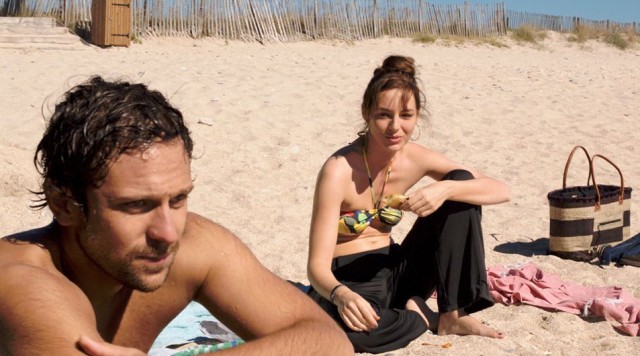
PIERRE ROCHEFORT AND LOUISE BOURGOIN IN GOING AWAY
Meandering mysteries
It will take you much of Nicole Garcia's meandering seventh film as a director to find out what the French title "Un beau dimanche" ("A beautiful Sunday") fully means. The pleasure of Garcia's narrative is that it's so devious, and takes us deep into the background of its main character. He's Baptiste Cambière (Pierre Rochefort, son of Nicole Garcia and the venerable star Jean Rochefort), a clearly brilliant, but mysterious and evidently troubled young man who works as a rambling grade school substitute teacher, who travels around France, unwilling to stay on at any one school more than a season. Baptiste clearly finds a cord of sympathy with Mathias (Mathias Brezot), a boy who's very bright in math but unmotivated. School ends, and Mathias' father forgets to come and pick him up. Baptiste gives him a ride to his father, who has forgotten it's his weekend to have the boy. It's the Whitsun Monday long holiday and Baptiste has nowhere to go, so he offers to take Mathias. One thing leads to another, and the next day he's driven to the beach where Mathias' mother Sandra (Louise Bourgoin) works managing a cafe kitchen.
By now Mathias, whos been neglected by both parents, has bonded with Baptiste and doesn't want him to go. And next it's Baptiste's turn to bond with Sandra. Her meanderings have been as wild and dangerous in their way as Baptiste's, about which we learn when, to save her from some gangsterish creditors she owes €50,000 to, Baptiste for the first time in years goes, with her and her son, to visit his wealthy family.
Going Away gradually reveals Baptiste's through his family members and flashbacks and what Sandra learns. A lot comes from his sister Emmanuelle Cambière (Déborah François) and more from his mother, Liliane (Dominique Sanda). Sanda is an icon, like Michel Lonsdale, who conveys a sense of history -- cinema history -- in her very being. There is something all-knowing, wise, and also stultifying in Liliane's declarations. This aristocratic family considers the rules it lives by immutable. But it is not Baptiste's intention to live by them.
As Baptiste Cambière, Pierre Rochefort is a fascinating character, monklike, gifted, and strange, and yes, also aristocratic; as well as gifted with remarkable explosive strength. (He has the quality of a Superman, impaired, but with an impairment leading possibly to exceptional powers.) Baptiste has the attraction of the dangerous and damaged. For some, Garcia's film will seem nonchalant and inconsequential, but for those who will look and think, it has some of the same richness of larger implications and complex questions of money, inheritance, class, and family that come up in Arnaud des Pallières' resonant, strange, unique film Adieu.
Going Away/Un beau dimanche, 91 mins., debuted at Toronto Sept 2013 and opened in France 5 Feb. 2014. It was screened for this review as part of the UniFrance-Film Society of Lincoln Center 2-16 Mar. 2014 film series Rendez-Vous with French Cinema. Showings:
Friday, March 7, 6:00pm – IFC; Monday, March 10, 4:00pm – EBM; Saturday, March 15, 9:30pm - WRT
Last edited by Chris Knipp; 02-17-2015 at 05:25 PM.
-
François Ozon: YOUNG AND BEAUTIFUL (2013)
FRANÇOIS OZON: YOUNG AND BEAUTIFUL/JEUNE ET JOLIE (2013
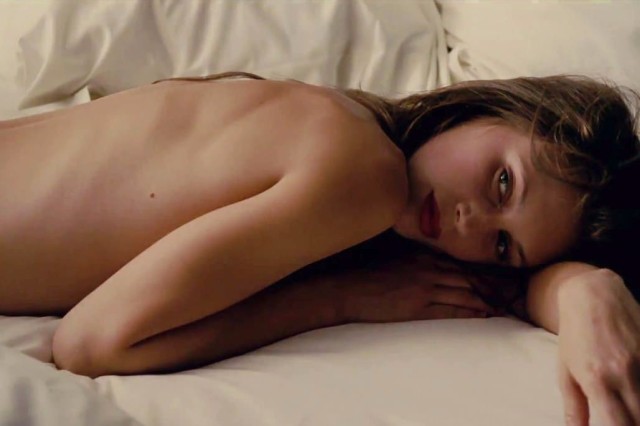
MARINE VACTH IN YOUNG AND BEAUTIFUL
Belle de jour ado
Ozon's Young and Beautiful (Jeune et jolie) is a shocker, but it's also simple and elegant, its elegant simplicity making way for ambiguities. Through this channel it's thought-provoking; but the beauty of this story, though it has rarely been told, is that it also contains little that is truly unexpected. Mike D'Angelo put it differently, tweeting from Cannes: "Character study of teen hooker initially seems banal, but banality proves to be its secret weapon." Jeune et jolie is a banal object that's also a glittering bauble sparkling from every angle.
A middle-class girl who lives at home and attends a famous Paris school, Lyçée Henri IV, has her 17th birthday, and then quietly sets about to become a pute, a prostitute. We might call her a "high priced call girl." With online media, it's a cinch for a well-informed ado (teenager) to set herself up for such "work," without the need of gangsters or pimps. In fact it's easier for a well-bred, well-off girl like Isabelle (long-limbed, gazelle-like ex-model Marine Vacth) to do it. Isabelle schedules up her meetings online or on a new cell phone she's bought for this purpose. She goes to expensive hotels and meets older, in several cases much older, men for sex.
And then something happens involving favorite client Georges (Johan Leysen) and her family finds out and, after several seasons have passed, she stops. Events lead to her talking to the a woman police officer and to a a male psychiatrist arranged by her mother (Géraldine Pailhas ). Naturally, the shrink (Serge Hefez) looks like one of her johns. So does her stepfather (Frédéric Pierrot ). Ozon doesn't take us inside the cold, elegant Isabelle's head. She is "precocious." But is she "warped," "perverse," "dirty" (her mother uses words like this) or just an adolescent discovering her sexuality and going through (in a word her stepfather uses) "a phase"?
A 17-year-old girl as striking and self-possessed as Isabelle can appear to be 20, or 18 anyway. Or, an older man who pays her €300 to come to his hotel room can pretend he thinks she is 20, because he wants to. The younger she is the fresher and more perfect she looks.
When the game is over Isabelle kisses a classmate at a party and he begins dating her, and spends the night at her house. It's on the way to being a normal sophisticated 21st century relationship of two young people. But Isabelle soon ends it. And because of what has happened it's not at all clear if she will have a "normal" sex life in years to come. Will Isabelle not become bored with an ordinary marriage and seek entertainment and profit in the afternoon, like Catherine Deneuve in Luis Buñuel's Belle de Jour? The precocious Isabelle (who takes the name Lea for her "work") is like an ado Belle de Jour. She's the ultimate jaded teenager, jaded far beyond her time -- before she has in truth learned much about life, she thinks she knows it all. And of course when she has sex with her classmate, Ozon can't resist showing that she can use sophisticated techniques to enhance his pleasure and enable his performance. Young and Beautiful is cool glittering prono, and a teenage manual for precocious sex.
Like Chabrol before him (and like Buñuel), François Ozon is a storyteller who tweaks the wilder edges of the bourgeoisie. It's normal to be precocious for young, sophisticated adolescents. Ozom touches on the tradition when he shows students at the Lyçée Henri IV discussing the poem by Arthur Rimbaud, a precocious poet at exactly that age, where he says no one is serous at 17. How naive are these young people? Christophe Honoré's La Belle personne (adapted from La Princesse de Clèves) adapts Paris teenagers into a complicated plot involving 17th-century courtiers.
As Leslie Felperin points out in Variety, Isabelle is first seen through binoculars wielded by her her younger brother, Victor (Fantin Ravat), "as she discreetly loosens her bikini bra to sunbathe topless. She’s indeed a character more often seen through others’ eyes, giving little of herself away." Victor, a slightly feminine little boy who wants to hear all about it, is like an understated eyepiece or alter ego for Ozon himself throughout. When Isabelle first 'sheds' her virginity with her "dumb" (con) "himbo" German boyfriend Felix, not even worth introducing to her family, Felperin notes, she is watching herself.
Young and Beautiful doesn't have the self-reflective meta- qualities of Ozon's other recent return to form, In the House, but is also, like it, a brilliant study of a risk-taking teenager, one this time whose gloss and sensuality may appeal even more to arthouse audiences. With a late, important cameo appearance by Charlotte Rampling.
Young and Beautiful/Jeune et jolie, 94 mins., debuted at Cannes 2013 and showed at many international festivals. Nominated for Two Césars (French Oscars) for Most Promising Newcomer (Marine Vacth) and Best Supporting Actress (Géraldine Pailhas). lIt opened in France 21 Aug. 2013 with highly favorable reviews (Allociné: 3.7). UK release was 29 Nov. Set to be released by Sundance in the US. It has been nominated for two 2014 César Awards: Géraldine Pailhas (Best Supporting Actress) and Marine Vacth (Most Promising Actress). Screened for this review as part of the UniFrance-Film Society of Lincoln Center series Rendez-Vous with French Cinema (6-16 Mar. 2014).
Friday, 7 Mar., 8:00pm – IFC; Saturday, 8 Mar., 6:30pm – WRT; Saturday, 8 Mar., 9:00pm - BAM
In Person: François Ozon.
Theatrical opening in NYC 25 April 2014.
Last edited by Chris Knipp; 01-02-2015 at 01:01 PM.
-
2 AUTUNS, 3 WINTERS (Sébastien Betbader 2013)
[This review is reprinted from the Nov. 2013 SFFS French Cinema Now Series reviews on Filmleaf.]
SÉBASTIEN BETBEDER: 2 AUTUMNS, 3 WINTERS (2013)
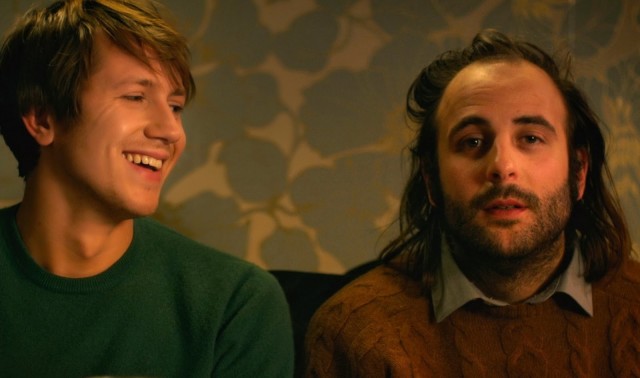
BASTIEN BOUILLON AND VINCENT MACAIGNE IN 2 AUTUMNS, 3 WINTERS
A 30-something coming-of-age-er with easy post-modern touches
Sébastien Betbeder shows with this second film that he's capable of mainstream, appealing stuff -- with an indie touch. His (TV film) debut Nights with Theodore (which won the SFIFF FIPRESCI Prize) was a romance that was strange bordering on creepy, but this time he gives us appealing white middle class French everyman-ish types from an arts background who settle down with girlfriends in their early thirties. The one-year-plus period contains the shift from early midlife confusion to finding a comfortable groove. The only thing that's eccentric is the excessive use of voiceover by the main characters, who also, so often that it becomes the film's ruling schtick, address the camera in solo reminiscences or turn to the audience and address us in the middle of a scene. Yes, it's too cute, but this movie is cute, and sweet.
The main character is Arman (Vincent Bacaigne, featured in the heralded new French young people's film The Battle of Solférino (which I tried hard to see in Paris but repeatedly missed). He is balding, long-haired, lightly bearded, with soulful puppy-dog eyes and a pretty face. Now 33, an amiable loser, Arman went to art school in Bordeaux and now lives in Paris, but won't tell us what he does for a living, doubtless because he knows he's not getting anywhere. Jogging in the local park, part of his attempt at a new start, he literally runs into his future life partner, Amélie (Maud Wyler). This meet-cute is so awkward and shy nothing yet comes of it. Arman keeps jogging every morning hoping in vain to meet Amélie again. Finally he runs into her at night when she's being mugged. He tries to intercede and gets stabbed. He's in the hospital for a while. She stays around.
This overlaps with a worse medical emergency that occurs to Arman's art school colleague and best mate Benjamin (Bastien Bouillon), who has a stroke: a skateboard boy calls 911. Benjamin is in the hospital longer than Arman, but recovers well and quickly. His novice speech therapist Katia (Audrey Bastien) becomes his girlfriend. Arman, Amélie, Benjamin, and Katia start double-dating, and go on a (for them) significant trip the Switzerland where Karia is from. They take a long hike up into the mountains.
All this is told with extensive to-the-camera narration by all four parties and divided into dozens of little chapters. Benjamin tells us what it feels like to lie under a bush face down unable to move and wait wondering if a skateboarder will have the sense to call for help. Amélie tells us what it was like to discover she's pregnant after crying midway during the challenging Swiss mountain hike and what she does about it, which almost ends her relationship with Arman when he belatedly finds out.
There is nothing very unusual in all this, except for the dual hospital trips, especially the stroke, but it's all delivered and filmed with a good deal of charm. Benjamin is an easygoing, reliably cheerful sort. It's he who smooths things over when Amélie has her crying jag in the mountains. Arman is more tentative and self-doubting, but together the two guys somehow balance each other out. Betbeder's simple, relaxed writing has an appealing way of presenting these 30-something issues so they're neither too heavy nor too flip.
Betbeder blends grainy 16mm and HD cinematography (by Sylvain Verdet) and lots of music by the French singer and songwriter Bertrand Betsch to the stylish mix that, in truth, seems more style than deep substance, but always pleases, its post-modern self-reflectiveness adding a touch of constant hipness without ever being hard to take. Arman and Benjamin, by the way, love Judd Apatow and find his Funny People "génial" (brilliant).
2 autonnes 3 hivers (the original title), 91 mins., debuted at Cannes in the ACID (Association du Cinéma Indépendant pour sa Diffusion) series, has been in several festivals including Hamburg and London. It opens theatrically in Paris 25 Dec. 2013 and I predict it will be a hit. What's not to like? Screened for this review as part of the French Cinema Now series of the SF Film Society, Nov. 7-10, 2013; presented Nov. 7 at 7 pm, with Betbeder featured for opening night of the series. This film went into limited US theatrical release Friday June 6, 2014
Last edited by Chris Knipp; 02-03-2017 at 06:32 PM.
-
MISS AND THE DOCTORS (Axelle Ropert 2013)
[This review like the preceding one is reprinted from the Nov. 2013 SFFS French Cinema Now Filmleaf reviews.]
AXELLE ROPERT: MISS AND THE DOCTORS (2013)
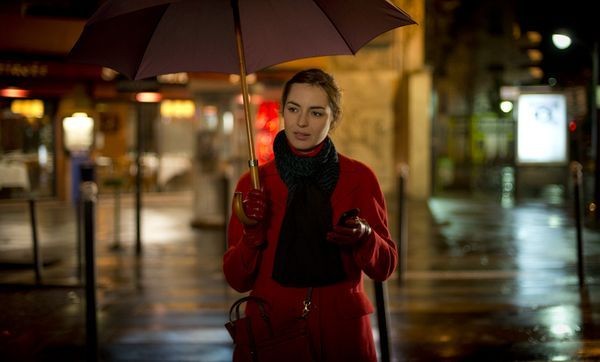
LOUISE BOURGOIN ROAMS THE 13e BY NIGHT IN MISS AND THE DOCTORS
Brotherly love triangle
In Miss and the Doctors the talented French writer and film critic Axelle Ropert continues the examination of tricky family relations and romantic ties she began with her 2009 Cannes Critic's Week debut The Woberg Family (R-V 2010). This time there is more focus, a distinctive urban setting, and a touch of noir. Two brothers, Boris and Dimitri Pizarnik (Cédric Kahn and Laurent Stocker), who are doctors with a joint practice, fall in love with the the same woman, a beautiful and implausibly elegant barmaid called Judith Durance (Louise Bourgoin), who's the mother of one of their patients, Alice (Paula Denis) -- a preternaturally composed and bespectacled preteen with diabetes that requires constant watching. Ninety-five percent of the action takes place in the working class, predominantly Asian 13th arrondissement of Paris, an important player here, which, especially since Judith works at night, makes for much gloriously garish and noirish color imagery by Céline Bozon, who also shot Woberg's good-looking rainy images and is the sister and cinematographer for actor-director Serge Bozon, who plays a friend of the brothers. (There is also a Paul Bozon, relation unknown, who plays a character called Rémi.) I have so far used the word "implausible" only once, but it will come up again. Much is to admire and enjoy about Ropert's work, but her writing background may lead her to invent more on the page than can make sense on the screen.
This is in part an illustration of the small and sometimes inbred world of French film, which leads to overlapping functions. Cédric Kahn has written and directed a number of films, only acted thrice, most recently in Elie Wajeman's cool, noirish, also Jewish-focused Aliyah where he plays the reverse role, the no-good addict brother. This time he's the dominant one, overshadowing his more hesitant blond brother Dimitri who's an alcoholic. We see Dimitri share rather oddly at several AA meetings. Boris' flaw is that he's overbearing and a bit gruff, which fits with Kahn's naturally deep, rough voice.
Besides Alice, Boris and Dimitri have other patients, of course, notably Kay (Alexandre Wu), a young epileptic who doesn't want to take his meds because they make him unable to get it up. "You don't understand, you don't have a girlfriend," the teen tells Boris. Of course Boris does, as it slowly develops, but this shows how odd and personal doctor-patient relations, not to mention doctor-patient-parent ones, tend to be in this movie. Things are dicey also with Annabelle (Camille Cayol), the brothers' medical secretary, who's in love with Boris. It doesn't seem like this double-doctor thing has a future and in fact it doesn't, and Annabelle has to be let go as a result of poor returns.
Things go back and forth between Judith and Boris with Dimitri's alcohol issues and desire to compete for Judith in the way. And Alice's father Max (Jean-Pierre Petit ), absent in Italy for a decade, reappears in response to a random phone call from Judith. The reappearance of Max is one of several ways the conflicts and their resolution both seem increasingly implausible -- there's that word again -- toward the end. There's a cute scene between Alice and Kay, the latter now working at a slurpy shop, with another, junior medical romance now hinted at, but it seems just a contrivance. So also is the way the sibling doctors just happen by pure chance to be called in to treat a medical problem of Max's, when he's just back but hasn't yet seen Judith.
What's noirish is Judith's barmaid lifestyle, and the slightly dicey, colorful, and largely nocturnal 13th arrondissement as seen in Céline Bozon's nice images. Another contrivance is Serge Bozon's scene as an intermediary friend (named Charles) sent back and forth one evening, Cyrano-like, between Boris and Judith to determine their feelings. Dimitri is reluctant to believe he's not in the running -- Ropert may have a bit of a thing for doomed romantic relationships. When Dimitri's hopes crumble the joint medical practice also disbands and Dimitri sets up a practice on the French Riviera; his glimpsed office seems to look right out onto a resort beach. Miss and the Doctors -- whose more sensible if hard to render French title means "Stick out your tongue, Miss" -- at this point seems to have dissolved into an American-inspired rom-com, and some of its basic pretenses have dissolved with it. But Ropert is original certainly and both her films use handsome visuals nicely to build the sense of particular location. These is a good use of actors -- even the static Bourgoin, from Anne Fontaine's mediocre Girl from Monaco becoming a striking icon of mysterious beauty. Music by Benjamin Esdraffo (of Bozon's La France) adds a verve that helps the locations come to life as part of the story. Jordan Mintzer of Hollywood Reporter, in an enthusiastic review that links this film with late Truffaut, comments that the music "reveals shades of New Wave composers Michel Legrand and Georges Delerue."
Torez la langue, mademoiselle, 102 mins., opened theatrically in France 4 Sept/ 2013 and was well received by local critics (Allociné press rating 3.6). Screened for this review as part of the San Francisco Film Society's French Cinema Now series (shown at Landmarks's Clay Theater 7-10 Nov.).
Last edited by Chris Knipp; 01-02-2015 at 01:04 PM.
-
THE SCHOOL OF BABEL (Julie Bertuccelli 2013)
JULIE BERTUCCELLI: THE SCHOOL OF BABEL/LA COUR DE BABEL (2013)
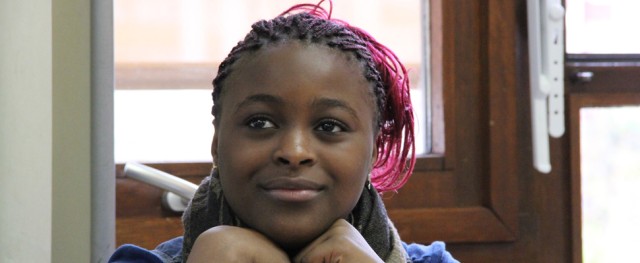
France welcoming young newcomers
Julie Bertuccelli's documentary is beautiful and colorful from the start, when some of the dozen or so 11-15-year-old "reception class" students at the school of La Grange aux Belles in Paris's 10 arrondissement go up and say and write "hello" in their native languages on the blackboard. They are black and white, Hispanic and Arab, and speak many languages. An argument breaks out right away about religion and language. Can a Christian use as-salaamu 'alaykum as a greeting, since it comes from Islam? It doesn't matter. They are instant friends. Though we see some acting out from several of the African girls, everyone is there to learn and to help each other as they all struggle to adapt to the French environment, academic program, and the French language. The prevailing spirit is of giving and sharing.
This is these infinitely various young people's "homeroom," the teacher, Brigitte Cervoni, who is patient, encouraging, but firm in constnatly correcting errors, is their faithful helper. Yes, this film is a bit like a non-fiction version of Laurent Cantet's Palme d'Or winning French classroom feature Entre les murs, but also will recall Nicolas Philibert's memorable study of elementary school To Be and to Have, with the similarity to the latter that the end-of-year farewells (this film too shot over the course of a year) are especially emotional because the teacher is retiring from the classroom, in this case to become a government inspector.
It's hard to imagine anything more touching than the group hugs at the end of the year, or the moment when a Ukrainian girl sings a beautiful song for classmates.
The kids tell about how they have come from bigger houses and have to face tiny accommodations in this expensive city. The very pretty Lebanese girl (who has also lived in Egypt) must leave because the government has found an apartment for her and her mother in Verdun. It seems a raw deal, but it means they will have a comfortable place to live, and they fear refusing the offer would offend authorities when their status is still uncertain.
Details emerge about many of the students. In particular Rama, from Senegal, has a way of acting out all the time, refusing to admit any fellow students are her friends. IIt turns out she was mistreated b her father's family back home, and the anger lingers in a hostile manner and neglect of her schoolwork. The lack of affect of Xin, a girl from China, is explained when it turns out her mother came to France ten years ago and she was by herself, and they're still cut off since her mother is working at a restaurnat all the time. But thanks to the new culture and the friendship of classmates Xin becomes a happier, more outgoing girl. Luca, from Northern Ireland, who his mother says was diagnosed when young with Asperger's and who hates math, also seems to grow into an otherwise good academic performer who is sometimes outspoken. A Serbian boy, typically for immigrants, turns out to be the bet in his family at French, acting as translator for his parents. And always Brigitte Cervoni is present in the background quietly prompting, encouraging, and correcting.
The theme of the French title, "The Courtyard of Babel," is rhythmically asserted with recurrent overhead shots of the school's courtyard, where students mingle freely.
All in all, this adds up to a glorious advertisement for the French social system. Except for a severe swimming instructor who sidelines a girl who has come to the pool repeatedly without the proper gear, we see only kindness, and it's hard not to make comparison with the US's current ruthless treatment of the undocumented, who are in jails, not schools.
French release 12 March 2014.
Saturday, March 8, 12:45pm – IFC; Sunday, March 16, 1:30pm - WRT Coming March 12 release in France.
Last edited by Chris Knipp; 01-02-2015 at 01:07 PM.
-
PLAYING DEAD (Jean-Paul Salommé 2013)
JEAN-PAUL SALOMÉ: PLAYING DEAD/JE FAIS LE MORT (2013)
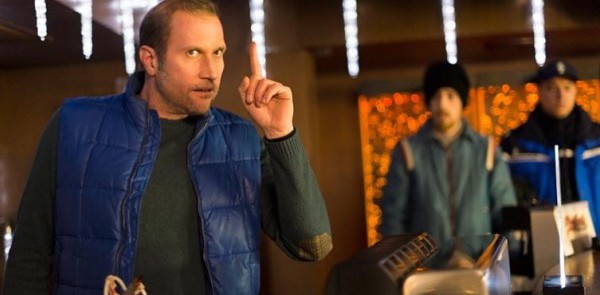
FRANÇOIS DAMIENS IN PLAYING DEAD
Contrivance
Jean-Paul Salomé's Playing Dead/Je fais le mort is a mildly entertaining but tonally uneven comedy-mystery that follows the familiar detective story device of playing musical chairs with suspects, winding up with one of the least likely ones. In the process Playing Dead piles on its wealth of scenes and plot twists that eventually turn mechanical.
The protagonist, failing actor Jean Renaut (François Damiens), is inconsistently conceived, morphing too easily from goofy loser to ace amateur detective. What is consistent is Renaut's need to interfere in the direction of his scenes, a trait that loses him a regular paycheck when he's fired at the outset from a TV cop series. Out of work and with bills to pay, he accepts a related job that, however, is only marginally "acting." He goes to the ski resort of Megève to play the victims for a police restaging of a multiple murder. Here, Renault's self destructive interference leads him to play detective when he's only mean to play victim.
Renault clashes/flirts with the "juge d'instruction" in charge, Noémie Desfontaines (Géraldine Nakache), again taking over and annoying her with his own theories about how the action went down in each murder. Of course he will turn out to be the one who is right, not her or local police lieutenant Lamy (Lucien Jean-Baptiste), winning Noémie's admiration and affection and leading to a collaboration with local innkeeper Madame Jacky (Anne Le Ny). None of this is remotely believable, and it started to feel like Damiens was becoming too much like his character -- a once promising newcomer (who a César as such early on) who's now just a hack going through the motions.
Energetic Belgian-French character actor Daniens is known for secondary roles in OSS 117: Cairo, Nest of Spies (2006), Heartbreaker (2010) and Delicacy (2011). He's in three films of the 2014 version of Lincoln Center's Rendez-Vous with French Cinema, the other two being the detective in Serge Bozon's oddbally police procedural Tip Top and the father of Sara Forestier in Katell Quillévéré's excellent crime-love melodrama Suzanne.
Jean-Paul Salomé has eight features listed on Allociné, the best received critically (3.4 press rating) being his 2008 Les Femmes de l'ombres/Female Agents, with Sophie Marceau and Julie Depardieu. He has shown a penchant for crime-mystery, with stabs at Belfagor and Arsene Lupin, but most of his films have not shown in the US or done well critically in France. The Paris-Match critic felt Playing Dead shows Salomé does better, as here, with a low-keyed low-budget film than "at the head of a superproduction." 11 December 2013 French release. A so-so Allociné press rating: 2.9. Screened for this review as part of the 6-16 March 2014 Unifrance-Film Society of Lincoln Center series Rendez-Vous with French Cinema. Public showings of the film:
Saturday, March 8, 6:00pm – BAM; Saturday, March 8, 9:00pm – WRT; Sunday, March 9, 3:15pm – IFC; Friday, March 14, 1:00pm - EBM
In Person: Jean-Paul Salomé
Last edited by Chris Knipp; 01-02-2015 at 01:10 PM.
-
SUZANNE (Katell Quillévéré 2013)--R-V
KATELL QUILLÉVÉRÉ: SUZANNE (2013)
[This review was written during the SFFS's French Cinema Now series in Nov., 2013.]
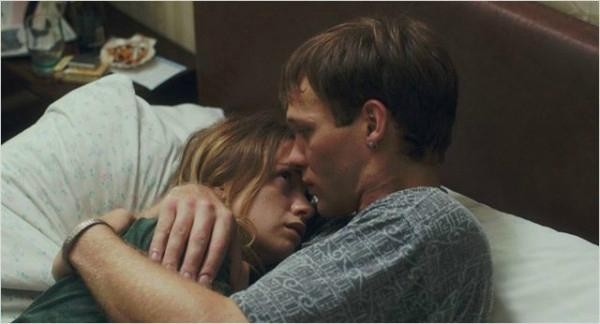
SARA FORESTIER AND PAUL HAMY IN SUZANNE
Criminal lovers
Katell Quillévéré's debut Love Like Poison (Un poison violent) (R-V 2011), a little coming of age film set in the provinces, did not really live up to its extreme title, but the director ups the ante marketly in the fast extreme story of a bad girl that is her second film, starring the frisky Saraa Forestier as the protagonist and François Damiens as her uneasy father. At Cannes when the film debuted in Critics' Week Catherine Shoard wrote in the Guardian, "The second feature from 33-year-old Katell Quillévéré [is] the sort of woozily shot, remorselessly emotional, acutely observed socio-realist soap that both confounds and confirms chick-flick prejudice." Indeed this could be seen as a crime story that due to its female point of view goes heavy on the love stuff and light on the crime stuff.
The blurb description of the film as "told in elliptical fragments that span 25 years" is misleading. Those "fragments" are simply sketches of Suzanne and her more staid sister Maria (Adèle Haenel, who was in Céline Sciamma's Water Lilies) slipping through their early years. They quickly lead us up to the key action that takes place when they are in their twenties. Suzanne has an illegitimate child, Charlie, who becomes part of the household of the girls and their widowed dad, Nicolas Merevsky (Damiens), while Suzanne works in the office of the trucking firm dad drives for. Suzanne then falls madly in love with a louche, lanky miscreant called Julien (strong newcomer Paul Hamy), disappears for a year, and then is sent to jail for burglary and assault as Julien's accomplice. Because Nicolas is out a lot, Charlie has been put into a foster home. At the court when Suzanne is sentenced, Nicolas is devastated, and rushes out.
As Catherine Shoard says, Quillévéré throws so much at you in a short time your feel manipulated. But this approach does permit her to cram a heap o' livin' into only an hour and a half. All I've described above takes place just in the first 46 minutes.
Sara Forestier is a gifted actress who's shown her ability to play a hellion before, 2010's The Names of Love being a good example. Paul Hamy has a savage look and manner that is her match and their scenes together are the most memorable in the film. In between Suzanne may just be waiting. Quillévéré used that title too soon: this is the "love like poison," a pleasing poison, evidently. Quillévéré shows here that she can make a powerful film too, though she is as overambitious this time as she was timid in the first film. Boyd van Hoeij in Variety thinks the director, her co-writer Mariette Desert and editor Thomas Marchan have trouble keeping the audience engaged or staying fully focused on the protagonist, and introduce some scenes that are incomprehensible or unnecessary. Despite the film's rush and brutal emotionalism, though, it knows how to stop and breathe too, even if sometimes it's more a gasp for breath. The sometimes documentary cinematography of Tom Harari is good at both long and very closeup shots, but is too murky at times. The acting is uniformly fine and the chemistry between Forestier and Haenel as sisters is great and between Forestier and Hamy as lovers more than great, almost scary.
Suzanne, 90 mins., debuted in Critics' Week at Cannes and opens theatrically in France 14 Dec. 2013. Screened for this film as part of the 7-10 Nov. San Francisco Film Society series French Cinema Now. Included also in the program of the Film Society of Lincoln Center-Unifrance 6-16 March 2014 series, Rendez-Vous with French Cinema. French release 18 December 2013, Allociné press rating: 4.1.
Saturday, March 8, 2:30pm – IFC; Sunday, March 9, 4:30pm – WRT; Wednesday, March 12, 4:00pm - EBM
In Person: Katell Quillévéré
Last edited by Chris Knipp; 01-02-2015 at 01:27 PM.
-
THE GILDED CAGE (Ruben Alves 2013)
RUBEN ALVES: THE GILDED CAGE/LA CAGE DORÉE (2013)
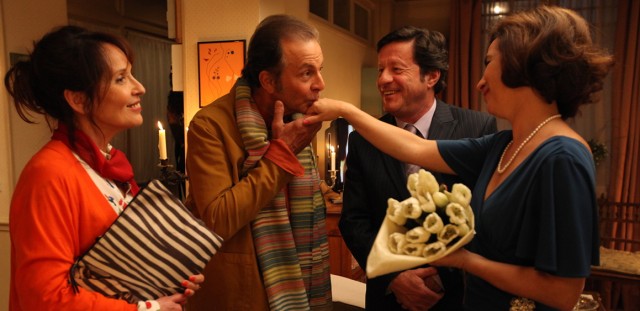
Chantal Lauby, Roland Giraud, Joaquim de Almeida, Rita Blanco
A comedy of class and nationality issues set in bourgeois Paris
The Gilded Cage/La cage dorée is a routine charmer that contains various ingredients older US arthouse audiences like. To begin with it states its movie-glossy view of its locale with romantically hazy panoramas of major Paris tourist landmarks. Its ground level focus is a nice middle-aged expatriate Portuguese couple, Maria and José Ribeiro, who have lived in Paris for some 35 years. Maria is the concierge of a posh Haussmannian building, another attractive locale, which provides her and José with a convenient if cramped ground floor apartment called the "loge." José is the foreman for a successful French building contractor. Both are indispensable to the French people they work for and serve. They begin to recognize how fulfilling and involving their roles are when news arrives of an inheritance from a family member back home involving houses and a farm producing port wine that provides an income of €200,000 a year. José, at least, has always wanted to return to a house in their native land. Here it is, and then some, an ancestral one, with a payoff. Essential condition for receiving this inheritance: the family must move back to Portugal.
The real issue is how José and Maria can resolve this conflict between their longtime ties in Paris -- intensified by the presence of their son Pedro (Alex Alves Pereira) and older daughter Paula (Barbara Cabrita), both of whom identify as essentially French -- and the rich inheritance and ideal conditions for returning home to Portugal. But instead of considering the issues involved in making a decision this serous and practical, in the manner, say, of a Jane Austen novel, Ruben Alves' film just jokes around about them for an hour or so.
The movie rushes all too eagerly to provide comic complications. Suddenly it emerges that Paula is romantically involved with the handsome Charles (Lannick Gautry), the son of José's boss Francis Caillaux (Roland Giraud) and ditsy wife Solange (Chantal Lauby).
Francis brings José to a fancy restaurant meal with entrepreneurs planning to build a shopping center and he's such a paragon of old-world craftsmanship and integrity the fat cats hire Francis on the spot to do the construction provided José's in charge. Francis also offers José a fat raise. And it turns out that the construction company has been on the skids of the past two years and if they can't take this job, which requires José's presence to sell, they're screwed. On the home front, the apartment building managers not only guarantee José and Maria can occupy the "loge" free of charge for a long time to come but will expand it, showing they're a lot nicer and more devoted to Maria than they may have seemed.
The status issues are driven home in an intentionally lighthearted but slightly gag-inducing manner when, to certify the union of Charles and Paula, their respective parents have a sit-down dinner at the "loge" full of embarrassing class comedy with Maria painfully trying to act posh and Solange Caillaux equally awkward in her straining to act down-home and her revealed ignorance of things Portuguese. The blurb's "sprawling cast of oddballs" is displayed throughout the film. Pedro in turns embarrasses himself by pretending to his lyçée girlfriend that his family is among the apartment building's rich occupants instead of mere caretakers.
La cage dorée has been nominated for a 2014 César for "best first film" and Ruben Allves has certainly delivered an able and fluent effort -- except that it is a mass of sit-com-like situations and clichés and offers nothing new. One might contrast Philippe Le Guay's recent period social comedy The Women on the Sixth Floor/Les Femmes du 6e étage about a rich financier (played by the impeccable Fabrice Lucchin) who discovers working class earthiness in 1962. This other treatment of Hispanics in Paris is quite conventional, meant only to amuse and warm the heart. But it still offers more solid matter than this fluffy effort -- which, while a bit thin on realistic detail, also isn't quite as hilarious and fun as it may intend.
La cage dorée, 90 mins, was released in Franch 24 April 2013. Critics were generally favorable, with the Allociné press rating a decent 3.5. Screened for this review as part of the Film Society of Lincoln Center-Unifrance joint 6-16 March 2014 series Rendez-Vous with French Cinema . R-V showings: Sunday, March 9, 9:30pm - WRT; Tuesday, March 11, 6:00pm – IFC; Saturday, March 15, 7:15pm - WRT.
Last edited by Chris Knipp; 01-02-2015 at 01:22 PM.
-
THE MARCHERS (Nabil Ben Yadir 2013)
NABIL BEN YADIR: THE MARCHERS /LA MARCHE (2013)

Grassroots political action in France
During the brief socialist presidency of François Mitterand and therefore a time of hope for leftists, it was known as "La Marche pour l'égalité et contre le racisme" (The March for Equality and Against Racism) and was nicknamed by the media "Marche des Beurs," using a slang word for French-born children of North African Arabs. But it was not just that, since according to this film, key members of the nine original marchers are non-Arabs, especially Claire (Charlotte Le Bon), a self-declared lesbian, Christophe Dubois (Olivier Gourmet), one of the leaders and anchors, and Sylvain (Vincent Rottiers), a young white unemployed man from the poor Minguette suburb outside Lyons, where the march begun in Marseilles got its inspiration. (Names have been changed; these are stand-ins for the originals.) The march took place from 15 October to 3 December 1983. It was the first national demonstration of its kind in France, part of a movement as much needed today as then, and largely forgotten. For director Nabil Ben Yadir clearly this is a labor of love for which he got fine support. The aim equally clearly is to entertain but also to edify and inform.
Two main demands the group formulates: a ten-year residency card and the right to vote for non-citizens. The group's conflicts about its stands are very nicely shown. All the rough edges are there.
The group goes to big cities, but while they are menaced by racists on the road, and one member is brutally disfigured, while another terrible attack takes place against a young Arab on a train, in the first town only one supporter shows up, if an enthusiastic one. But they gather numbers and get on the national news; bravely visit Dreux, a town where the ultra-right National Front had just gained electoral strengh; and when they get to Paris there is a real Paris-style march of well-wishers, 100,00 strong.
Ben Yadir does an excellent job at a task that's not so easy, dramatizing a group event that includes few dramatic events. But there is plenty of specific personal detail. It begins when charismatic young Mohamad (Tewfik Jallab) is gravely injured by a policeman. His friends want to attack the shooter, but the more useful response of non-violent action inspired by Gandhi and Martin Luther King is devised. Kheira (Lubna Azabal of Paradise Now, Incendies and Coriolanus), a tough, heavy-smoking French Arab political organizer, joins and becomes the group's voice, often provocative toward individual menbers but clear and eloquent when it's time to give a speech. A fat boy called Farid (M'Barek Belkouk), soft, obsessed by food, and not very willing to go on long walks at first, becomes a stalwart, and keeps a journal that will be one of the event's key records. Also featured is the popular Jamel Debbouze as oddball druggier marcher Hassan and Philippe Nahon as the grumpy but loyal driver of the backup van.
The march's romantic couple turns out to be Sylvain and Monia (Hafsia Herzi of Secret of the Grain) though in a late scene in the film Monia expresses doubt that their cross-cultural affair can endure. The strength of these two actors shows the depth of the casting here. The Marchers is involving, sometimes quite moving, even if it's a little long and the mise-en-scène is flat and the overall impression is of a TV movie that's way better done than you'd expect. It would have been nice to have follow up on the movement and the group, including snapshots showing the real people as they were then and are now.
The Marchers/La marche, 12- mins, Nabil Ben Yadir, France/Belgium, 2013, 120m. Released 27 November 2013 in France, the film got decent reviews (Allociné press rating: 3.4). Screened for this review as part of the Unifrance-Film Society of Lincoln Center 6-16 March 2014 series, Rendez-Vous with French Cinema. Schedule: Saturday, March 8, 9:45pm – IFC; Sunday, March 9, 1:30pm – WRT; Friday, March 14, 3:30pm - EBM
In Person: Nabil Ben Yadir
Last edited by Chris Knipp; 01-01-2015 at 07:53 PM.
 Posting Permissions
Posting Permissions
- You may not post new threads
- You may not post replies
- You may not post attachments
- You may not edit your posts
-
Forum Rules



























 Reply With Quote
Reply With Quote

















Bookmarks